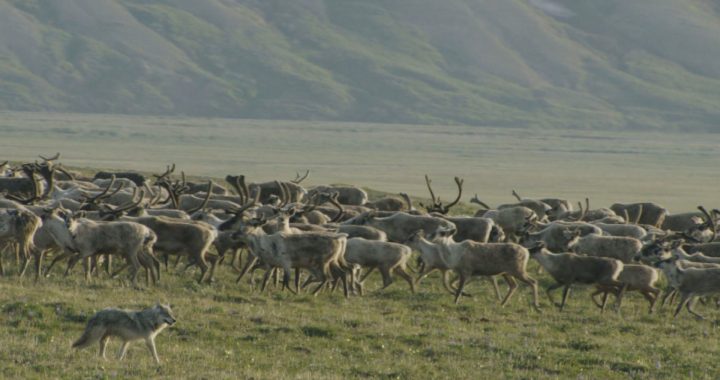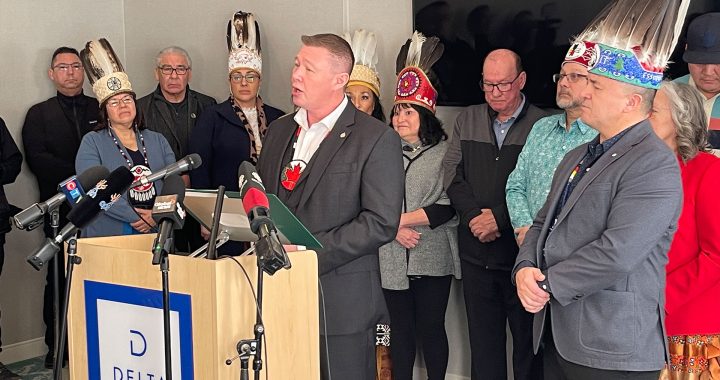(Main page image taken from Tsilhqot’in nation film Blue Gold)
By Jorge Barrera
APTN National News
Citing concerns over the infringement First Nations traditional rights and the impact on fish habitat, the British Columbia government rejected an expansion plan from a lodge that sits several kilometres from the site of a proposed copper and gold mine now facing intense opposition from area First Nations communities.
Siegfried Reuter, owner of Taseko Lake Lodge, which sits about 10 kilometres away from the epicentre of the proposed Prosperity mine, was rejected by the provincial government in 2004 when he tried to expand his operations by 35 hectares.
Reuter said he was stunned to learn the massive Prosperity mine project had passed B.C.’s environmental review. In 2004, Reuters said he had a much smaller proposal rejected on environmental and First Nations rights grounds.
The 35 square-kilometre Taseko Mines Inc. project will destroy a watershed and drain Fish Lake, which is sacred to area First Nations communities.
The Oct. 26, 2004, rejection letter Reuter received from the Land and Water Management division at Williams Lake, B.C., read in part:
“I have decided to disallow your application as there are specific First Nations issues within the boundaries of this application concerning traditional and cultural use. In addition, the Ministry of Water, Land and Air Protection have brought forth information that development within the boundaries of this application would impact fish habitat including salmon and blue-listed bull trout.”
The proposed mine would be built in the middle of one of Canada’s most pristine wilderness areas, surrounded by mountains and dotted with lakes.
Reuter said the rejection of his plan makes no sense in light of the province’s decision to allow a massive mining project which would destroy an ecosystem with the promise of an artificial version to replace it.
“There is a biased play going on within the government. We were pointedly denied in 2004 because of First Nations and fish concerns. Six years later they are approving a project that will not only kill…an entire ecosystem, it is entirely opposed by First Nations,” said Reuter. “It is a rather insane project.”
A spokesman for the B.C. Ministry of the Environment said they would look into the issue.
A spokeswoman for the Ministry of Forest and Range, which now oversees the former Land and Water Management division at Williams Lake, also said they were looking into the issue.
The mining project, which would sit about 125 kilometres southwest of Williams Lake, is facing intense opposition from First Nations communities across the province and environmental groups across the country.
Williams Lake is about 495 kilometres north-east of Vancouver.
The project, which will turn Little Fish Lake and parts of Fish Creek into a tailings pond, poses a direct threat to the Tsilhqot’in people who have depended on the land and waters since time immemorial.
The Tsilhqot’in nation has vowed to stop the project at all cost, even with their lives.
The mine will also put the lodge out of business. Reuter said he has invested about $2 million into the lodge over the last 10 years. It sits about 2.5 kilometres from the edge of the proposed tailings pond. The main grazing area for the lodge’s horses is the site of the replacement Prosperity Lake proposed by Taseko Mines.
With approval from the B.C. government already in hand, Prosperity mine now needs the blessing of the federal cabinet.
Taseko Mines vice-president of corporate affairs Brian Battison said the company expects a decision by late September or early October.
Battison said the company was “optimistic” the federal cabinet would approve the project.
While cabinet confidentiality prevents disclosure of the type of information federal minister will have when they make their decision, an analysis of information on the project reveals widespread concern from federal departments about the mine’s environmental impact.
Cabinet is expected to have at least four main documents on the Prosperity mine project. The documents include: The Canadian Environmental Review panel report, a First Nations consultation report; a memorandum to cabinet outlining the position of the Department of Fisheries and Oceans (DFO), Natural Resources Canada and Transport Canada; and a report from the B.C. environmental assessment which approved the project.
The federal environmental review panel report found that the project would have a devastating impact on the environment and on First Nations communities in the area.
The First Nations consultation report is also expected to reflect the blanket rejection of the project by area communities.
The cabinet memorandum on the position of government departments will likely also echo submissions by the departments to the federal environmental review panel.
DFO expressed concerns that Taseko Mine’s plans for a replacement lake would not meet the department’s “no net loss” policy. Under the policy, if fish habit is destroyed it needs to be replaced by another habitat to make up for the loss.
The department concluded the Taseko Mine’s “proposed fish and fish habitat compensation measures would not even meet a 1:1 ratio,” according to a DFO submission contained in the environmental review panel report.
A former DFO scientist, who has since consulted internationally on fisheries, said Taseko Mine’s habitat compensation plan was “a bad joke” and impossible to accomplish.
“They talked about replacing the loss habitat at a ratio of eight to one, they said they were going to create eight new units for the ones they destroyed,” said Gordon Hartman, who submitted a “yard by yard” analysis of Taseko Mine’s plan on behalf of the Tsilhqot’in nation. “It is just nonsense, the whole project.”
Hartman said Taseko Mines classified as replacement habitat a dug-out, 11 kilometre ditch to collect water flowing down the sides of hills.
“(Prosperity Lake) does not replace the kind of habitat that is lost in (Fish Lake),” said Hartman. “The fake streams they are putting in do not replace quantitatively or qualitatively the streams they are getting rid of.”
Transport Canada also “expressed concerns” about the project. The department concluded that “Prosperity Lake would not adequately mitigate the losses of the fishing and recreational experience at Teztan Biny (Fish Lake) or the use by First Nations,” according to an outline of the department’s position contained in the environmental panel’s report.
Natural Resources Canada also expressed initial concern that Taseko had underplayed the earthquake threat to the region in its construction plans. The department however said they were satisfied with the company’s updated designs.
When contacted by APTN National News Wednesday, Battison asked for and obtained a list of questions he said would receive responses.











1 thought on “BC gold mine area once no-go zone”
Comments are closed.